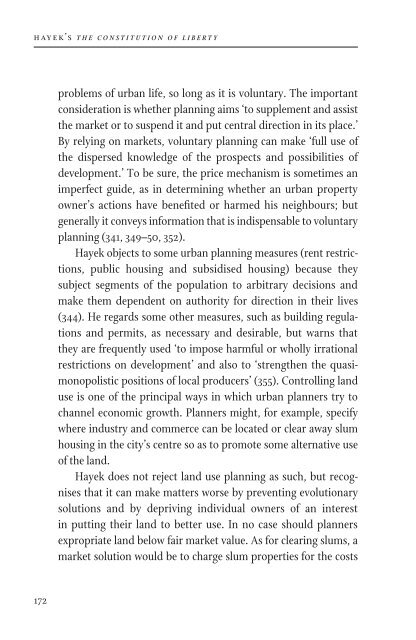Hayek's The Constitution of Liberty - Institute of Economic Affairs
Hayek's The Constitution of Liberty - Institute of Economic Affairs
Hayek's The Constitution of Liberty - Institute of Economic Affairs
You also want an ePaper? Increase the reach of your titles
YUMPU automatically turns print PDFs into web optimized ePapers that Google loves.
h ay e k ’ s t h e c o n s t i t u t i o n o f l i b e r t y<br />
s a f e g ua r d i n g p r o g r e s s<br />
problems <strong>of</strong> urban life, so long as it is voluntary. <strong>The</strong> important<br />
consideration is whether planning aims ‘to supplement and assist<br />
the market or to suspend it and put central direction in its place.’<br />
By relying on markets, voluntary planning can make ‘full use <strong>of</strong><br />
the dispersed knowledge <strong>of</strong> the prospects and possibilities <strong>of</strong><br />
development.’ To be sure, the price mechanism is sometimes an<br />
imperfect guide, as in determining whether an urban property<br />
owner’s actions have benefited or harmed his neighbours; but<br />
generally it conveys information that is indispensable to voluntary<br />
planning (341, 349–50, 352).<br />
Hayek objects to some urban planning measures (rent restrictions,<br />
public housing and subsidised housing) because they<br />
subject segments <strong>of</strong> the population to arbitrary decisions and<br />
make them dependent on authority for direction in their lives<br />
(344). He regards some other measures, such as building regulations<br />
and permits, as necessary and desirable, but warns that<br />
they are frequently used ‘to impose harmful or wholly irrational<br />
restrictions on development’ and also to ‘strengthen the quasimonopolistic<br />
positions <strong>of</strong> local producers’ (355). Controlling land<br />
use is one <strong>of</strong> the principal ways in which urban planners try to<br />
channel economic growth. Planners might, for example, specify<br />
where industry and commerce can be located or clear away slum<br />
housing in the city’s centre so as to promote some alternative use<br />
<strong>of</strong> the land.<br />
Hayek does not reject land use planning as such, but recognises<br />
that it can make matters worse by preventing evolutionary<br />
solutions and by depriving individual owners <strong>of</strong> an interest<br />
in putting their land to better use. In no case should planners<br />
expropriate land below fair market value. As for clearing slums, a<br />
market solution would be to charge slum properties for the costs<br />
they impose on the rest <strong>of</strong> the city. <strong>The</strong> slums would probably<br />
disappear and be replaced by commercial or industrial buildings.<br />
Slum clearance is hard to justify, however, in terms <strong>of</strong> what is good<br />
for the slum dwellers. <strong>The</strong> poor find it economically advantageous<br />
to live in centrally located slums; and public housing is not a desirable<br />
option. Subsidising people to remain in the city has the effect<br />
<strong>of</strong> stimulating ‘the growth <strong>of</strong> cities beyond the point where it is<br />
economically justifiable.’ Moreover, it deliberately creates ‘a class<br />
dependent on the community for the provision <strong>of</strong> what they are<br />
presumed to need.’ A logical next step for planners, in addressing<br />
urban problems, would be to control who will be allowed to move<br />
into a city. <strong>The</strong>ir inclination, in any event, is to subject the whole<br />
economy to ‘administrative despotism’ (347–8, 351, 354).<br />
Agricultural policy<br />
Agricultural policy in Western countries must face up to the<br />
fact that a population’s food requirements, even if growing, can<br />
be met by fewer farmers than ever before, owing to enormous<br />
gains in agricultural productivity. Having too many agricultural<br />
workers depresses average farm income and produces rural<br />
poverty. Although agriculture is ‘peculiarly sluggish in its adaptation<br />
to change,’ rural workers themselves have gradually dealt<br />
with their plight by moving to other jobs, particularly in urban<br />
industries. Governments should encourage and facilitate this<br />
redistribution <strong>of</strong> workers by allowing the marginal land and<br />
farms to be eliminated. With fewer workers supplying agricultural<br />
products, average farm income would rise and might keep up with<br />
the general increase in incomes. In fact, however, governments<br />
have delayed the necessary adjustment by trying to maintain a<br />
172<br />
173












